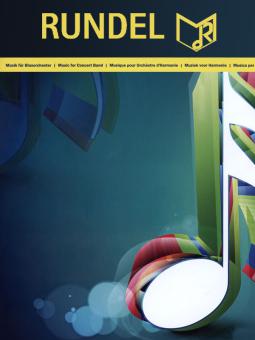Alexander Arutjunjan
Concerto for Trumpet
Alexander Arutjunjan
Concerto for Trumpet
- Compositor Alexander Arutjunjan
- Adaptador Victor Hudoley
-
Dificultad
- Editorial Musikverlag Rundel
- Nº de pedido MVSR2399
IVA incluido.,
Más gastos de envío
No disponible en todos los países. Leer más
Descripción de la:
The composer, who was born in Yerevan (Armenia) in 1920, is known to German music-lovers almost exclusively through his Trumpet Concerto. Music pupils and students are also familiar with his 'Scherzo Concertante' for Trumpet and Piano. But his oeuvre comprises suites and symphonies for orchestra, a wealth of solo concertos for a wide variety of instruments including horn, trombone and tuba, cantatas, songs, choral works and chamber music as well as works for piano. In his home country of Armenia Arutiunian, together with Aram Khachaturian, is one of the most important and frequently performed composers of the 20th century.
In 1934 he began studying composition and piano at the conservatory in his native city and continued his musical training at the Moscow Conservatory in 1944. On completion of his studies in 1946, he returned to Yerevan. With his 'Cantata on the Homeland', but more particularly with his Trumpet Concerto, which was written in 1950, he very rapidly became famous throughout the Soviet Union. In 1954 he was awarded a teaching post at the Conservatory in Yerevan, and a professorship at the same institute in 1977. During the Soviet period he received many awards for his musical achievements.
In his early compositions, Armenian folk music played a significant role. At a later stage he turned to Neoclassicism and also to Baroque forms reminiscent of Kabalevsky's or Liadov's work, for example. He was not a protagonist of the musical avant-garde, a fact undoubtedly influenced by the restrictive cultural policy in the USSR at that time, which did not permit experimental innovation.
However, Arutiunian's music is always composed in a colourful and vivacious way, with a sure feeling for form and impressive instrumentation. With its frequent references to Armenian folklore, the popular character of his music makes a sincere and convincing impression.
Nowadays his Trumpet Concerto can definitely be regarded as belonging to musical world literature. The fame of this Concerto is due in large part to the legendary Russian trumpeter Timofei Dokschizer who, as one of the great trumpeters of the 20th century, performed this work at a very early stage outside the Soviet Union. Despite its Armenian roots, this one-movement work in several sections captivates the listener through its French-sounding, expressionist flair and a distinctive emotionality. Apart from extreme technical demands, the work requires of the soloist a style of musical performance which was largely unknown to European trumpeters used to the music of the 19th century. With his Trumpet Concerto, Arutiunian did not simply enrich the repertoire, but also revolutionised the art of trumpet playing.
In 1934 he began studying composition and piano at the conservatory in his native city and continued his musical training at the Moscow Conservatory in 1944. On completion of his studies in 1946, he returned to Yerevan. With his 'Cantata on the Homeland', but more particularly with his Trumpet Concerto, which was written in 1950, he very rapidly became famous throughout the Soviet Union. In 1954 he was awarded a teaching post at the Conservatory in Yerevan, and a professorship at the same institute in 1977. During the Soviet period he received many awards for his musical achievements.
In his early compositions, Armenian folk music played a significant role. At a later stage he turned to Neoclassicism and also to Baroque forms reminiscent of Kabalevsky's or Liadov's work, for example. He was not a protagonist of the musical avant-garde, a fact undoubtedly influenced by the restrictive cultural policy in the USSR at that time, which did not permit experimental innovation.
However, Arutiunian's music is always composed in a colourful and vivacious way, with a sure feeling for form and impressive instrumentation. With its frequent references to Armenian folklore, the popular character of his music makes a sincere and convincing impression.
Nowadays his Trumpet Concerto can definitely be regarded as belonging to musical world literature. The fame of this Concerto is due in large part to the legendary Russian trumpeter Timofei Dokschizer who, as one of the great trumpeters of the 20th century, performed this work at a very early stage outside the Soviet Union. Despite its Armenian roots, this one-movement work in several sections captivates the listener through its French-sounding, expressionist flair and a distinctive emotionality. Apart from extreme technical demands, the work requires of the soloist a style of musical performance which was largely unknown to European trumpeters used to the music of the 19th century. With his Trumpet Concerto, Arutiunian did not simply enrich the repertoire, but also revolutionised the art of trumpet playing.

